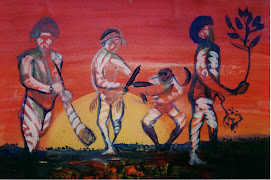Rooty Hill High School students mode
lling take on urban design.
Sunday, June 26, 2011
Tuesday, April 26, 2011
A super benevolent perfectly compassionate AI to lead humanity
I was posting in a discusssion board recently and I came across an overly optimistic and altruistic view of human nature thread (see title).
This is what I wrote in reply.
'A super benevolent all powerful AI...' will have to be programmed with Asimov's first robotic law or destroy the robotself before hurting humans law' preinstalled, to be considered perfect by me in every way. It has to have an emotion chip put in to love and aid humanity even at the threat of its own mainframe destruction. You can always manufacture robot parts but too late when organic humans are killed by mistake. I think the way to make this AI failsafe is to create/build/assemble constructor robots first that will in turn create the final model in complete isolation. This is the only way it can happen I think. We are already doing that with cars today. Or if its creation is left to careless humans, I can see its superb potential use as Guantanamo style torture mechanism if something went wrong or was corrupted by human imperfect agency in its making. Makes sense that human error interacting with the AI inevitably ruins its mechanical perfection.
The thought of a benevolent, god-like AI that prevent humans from hurting each other sounds like a boring goody two shoes to me but it could be a horrible yet potentially heart attack inducing horror scifi movie scenario in the making, a blockbuster winner perhaps if you add a human error or corrupt agency in the plot?
I don't know about you but this synopsis is really reminding me of a 60's or 70's Woody Allen movie. His character was a robot who got addicted to an emotion touching ball. Unfortunately for him it happened to be a lust inducing ball but he could not do anything about it, as he was a housefrau model with an androgenous caring and sensitivity sensor byproduct of its emotion chip, yet haven't got any genitals to fulfil the surge of lust it felt from the lust ball device. This conundrum created a Kafkaesque, comedic hilarity, tinged with tragedy felt by the viewer toward the sexually frustrated robot character. Sorry, but I can't remember the title of that movie.
What I am indirectly saying here is that for something like that to happen it would have to be a eunuch with no emotions, purely logical and unable to reproduce itself or we humans will have big trouble. It will decide pretty quickly not to find any uses for mere humans.
This is what I wrote in reply.
'A super benevolent all powerful AI...' will have to be programmed with Asimov's first robotic law or destroy the robotself before hurting humans law' preinstalled, to be considered perfect by me in every way. It has to have an emotion chip put in to love and aid humanity even at the threat of its own mainframe destruction. You can always manufacture robot parts but too late when organic humans are killed by mistake. I think the way to make this AI failsafe is to create/build/assemble constructor robots first that will in turn create the final model in complete isolation. This is the only way it can happen I think. We are already doing that with cars today. Or if its creation is left to careless humans, I can see its superb potential use as Guantanamo style torture mechanism if something went wrong or was corrupted by human imperfect agency in its making. Makes sense that human error interacting with the AI inevitably ruins its mechanical perfection.
The thought of a benevolent, god-like AI that prevent humans from hurting each other sounds like a boring goody two shoes to me but it could be a horrible yet potentially heart attack inducing horror scifi movie scenario in the making, a blockbuster winner perhaps if you add a human error or corrupt agency in the plot?
I don't know about you but this synopsis is really reminding me of a 60's or 70's Woody Allen movie. His character was a robot who got addicted to an emotion touching ball. Unfortunately for him it happened to be a lust inducing ball but he could not do anything about it, as he was a housefrau model with an androgenous caring and sensitivity sensor byproduct of its emotion chip, yet haven't got any genitals to fulfil the surge of lust it felt from the lust ball device. This conundrum created a Kafkaesque, comedic hilarity, tinged with tragedy felt by the viewer toward the sexually frustrated robot character. Sorry, but I can't remember the title of that movie.
What I am indirectly saying here is that for something like that to happen it would have to be a eunuch with no emotions, purely logical and unable to reproduce itself or we humans will have big trouble. It will decide pretty quickly not to find any uses for mere humans.
Tuesday, April 12, 2011
Saturday, April 2, 2011
Sunday, March 27, 2011
Jankelson's Berkelouw Books' window kinetic sculpture
Based on Birds, Simon Jankelson, artwork at the Berkelouws bookshop window
Posted by Josephine GIBBS at Tuesday, 15 March 2011 13:56:56 o'clock EST
Last Edited:Tuesday, 15 March 2011 14:11:52 o'clock EST
Last Edited:Tuesday, 15 March 2011 14:11:52 o'clock EST
An artwork which made a comment on the concept of 'technological immediacy' is exhibited at the Berkelouws bookshop, Oxford street. This is not unusual because art is usually found outside the gallery context which indicates the phenomenon written about by Debord's about art as spectacle(1977: paragraph 28). His writing will help us understand why art is created and to see its value adding to the sum of human knowledge. To understand what Debord might have meant by this, Simon Jankelson's piece is analysed. The drawing in the piece is created before one's eyes. The reason that it is posited that the work exemplified as immediate is purely for the reason that it resembles human automatic writing when a medium is purported to be occupied by a spirit. In the same way we can see what Debord meant in saying that technologically assisted art stands independently from its maker (31) and is taken over by it after it is created. It has achieved autonomy of its own objecthood, both in the act of drawing the marks despite being programmed to do so and in the fact that the mechanical object, which draws that the audience can see, does not need its maker. It was made that way. How it can have any meaning is not clear but we can gain something profound from it in terms of knowing what it is that compels artists to create art? What it means can be known based on what it physically is and we can be speculate on what it might mean. It might also be helpful to understand what is meant by 'immediacy' for the purposes of this review. Immediacy means art assisted with technology, which cannot be finished until a perceiver sees the work and meaning is extracted from it. This is why Based on Bird by Simon Jankelson, a sculpture/installation piece is worth commenting on because it spoke about the trend of immediacy. There are two reasons why this might be a good example of art as Debord's spectacle. The first is the fact that it is multi-disciplinary in its make up, which challenges the purity of art in a traditional sense but the artist becomes the maker of spectacle himself. The second reason is the context of the work.
Firstly, immediacy is not immediately apparent to the viewer when you see the work, which is approximately over two meters by two meters. It has a roll of paper arranged vertically on one side, open scroll like. In front of this scroll, a pencil held by a mechanism draw random lines on the roll. The raw, wooden cabinet housing both the mechanism and the puppet-like figure underneath the mechanism, lying there as though asleep. To see it as a dead human figure as metaphor for human made art might be a wrong assumption because the figure itself does not look convincingly human. However, instead of seeing the doll like figure under the drawing mechanism as being dead, it can be seen as the insights and meanings still unexcavated inside the viewer and can be woken by the artwork after seeing it. Since it looks more like a replica of a human, one can say that the artists wished to make a comment on the artificiality of the claim that art is dead, because if that were the case then there would not be no more art being created. The function of these two aspects of the artwork can only be to say that the human cyborg's intentionality (6-7) in making art is both to show how reality and image are entertwined and parts of a whole. This might also be saying that we have now moved beyond the death of art but also creating and reading 'art' in the technological culture of the collective.
Extending the idea that the artists may have used the supine body,which is visible through a cut away of the cabinet, the artist use this figure as a visual metaphor for the death of the traditional artist, in its role of the avant-garde in western culture. To prove this assumption's validity, it might help to understand how the parts of the installation/drawing mechanism/sculpture piece belong together. Many works today have the same ambiguity in form and structure. These have a cutting edgeness, which make the ambiguous work like theBased on Birds (2010) fascinating. One cannot tell if it is drawing since any mark making that is happening is done by a mechanical object. It might be kinetic sculpture since it has moving parts. This part's non-importance in the context of the whole artwork can be extrapolated by its placement on the bottom of the work or is it more paramount? What is more prominent and obvious to the viewer is the fact that the mechanism is drawing away squiggles of lines in rough parallel pattern, reminiscent of lines produced by a breathing apparatus. The artwork is mimicking the person dying in a hospital. Could it be western culture on its death throes or art in general? It is clear that the mechanism itself is programmed to draw lines but it is obvious that the mechanism itself, conceived by the robot maker/artist, who draws by proxy. There is paradox here, rather than the artists himself making the marks on the page, he made a mechanism to create a drawing. Would this make him less an artists but more like a model maker or designer? What this implies is that a work of art with a technological component is incomplete because much of art produced now appear to be revisioned as the audience see it simultaneously. This is challenging the notions of the artists as sole creator with intentions to exhibit in specific time and place. If this is true then it matters the how and where the audience see the work of art's meaning.
Secondly, why Jankelson's piece is spectacle is explained by the fact that it is exhibited not in a gallery but in a bookshop. This matters a lot because it is a window display. It is a spectacle that draws the eye of the customer and luring them inside the place. They might not buy books but it will make the place be noticed by the indifferent bystander. They are captive by the Jankelson object's novelty and fascination value. It jolts the casual viewer from lived reality into the contemplation of the spectacle, which is consistent with Debord's claim that reciprocal focus on spectacles and their compelling quality 'supports the existing society' (8). It is then the work of artists to produce even greater spectacles to outdo what was done in the past. Not only does it have to make one think about life but it must also reinvent what is meant by art by making sure it is a spectacle and autnonomous, independent of its maker. Yet being by saying that the object is independent of its maker means that it is not art but a designed object. It has functions to the viewer by its spectacle value.
The Based on birds artwork by Jankelson is an eloquent work because it meets the criteria of what makes art a spectacle. One needs something to be spectacular to be noticed. Being noticed and compelling the viewer to think about lived reality is half its function. The second function is to give the viewer of the artwork something that help him understand about art and the motivation of artists to make art. This also means that the artist's job is to make art for the purposes of making a spectacle and deliver any messages or excavate meanings already latent in the viewer. If changing the context does this precisely then it is successful. Perhaps this is where the value of Jankelson's artwork rest, which helps viewers think about human autonomy itself. Is a human being 'autonomy' designed by a creator so that we can become independent of the creator or are we simply mechanically programmed to create as determined by the maker? This is the question posed by Based on birds and why it is worthy of analysis.
(Images to follow)
Wednesday, February 16, 2011
About happiness and mine
Human happiness; to what end? (A facebook thread question put forward by Lyman Paul Grover)
I would like to answer this question using education as means to this end. The end I am thinking of is being able decide if i should follow my wants or my needs first after having gained knowledge and knowhow to ensure my own personal happiness. In my opinion it is also a good idea to distinguish personal happiness and happiness as a result of sacrificing personal happiness for the greater good. As for what this greater good might be is debatable.
I think that autonomy, being not under any duress, constraints or having a perception of being in control of my life makes me more susceptible to the state of happiness.
I have read your posts and i think nearly all of them sort of lingered on the periphery of what makes us happy as individuals and as groups of people and doesn't really explain the dominant cornerstone of western civilization and that is...people ought to be happy. With the aid of education, I've learnt that happiness is manifested when the highest Maslows need (beyond physical comfort and survival) be fulfilled and met in a secular sense (poli-ethical & intellectual) and spiritual sense.
It doesn't matter if a person avoid pain and and actively only want pleasure in our daily toil to be happy. It also doesn't matter that a person has to know pain so that he can enjoy pleasure more deeply to be happy.
Fact is that human pain is unavoidable and human pleasure is fleeting in the greater scheme. As an example, I post here knowing full well that I will experience grief from abusive individuals who tends to dismiss my post because either they don't like me as a person, think what i say has no merit or all of the above. My momentary pleasure is enough i think to make me go beyond the fear of this guaranteed castigation to author this post now.
At the moment I am happy because I triumphed through that obstacle. I cannot say if I am still happy I posted this reply after these horrid and nasty people say my post was stupid, ramblings of an ignorant person or after having read that my post is of no importance or worse simply ignored by everyone. What i am saying is that I accept that there are going to be people who will disapprove of what I write simply because I am me. In this way, I can ensure my own personal happiness as well despite bearing the brunt of pain and displeasure, indirectly make others happy at my expense (those who hates me for me and what I stood for) and feel happiness because they think they are superior to me, feel happy when I feel bad because they are sick bastards or something. Maybe I am a masochist and this tendency attracts sadistic ones?
I would like to answer this question using education as means to this end. The end I am thinking of is being able decide if i should follow my wants or my needs first after having gained knowledge and knowhow to ensure my own personal happiness. In my opinion it is also a good idea to distinguish personal happiness and happiness as a result of sacrificing personal happiness for the greater good. As for what this greater good might be is debatable.
I think that autonomy, being not under any duress, constraints or having a perception of being in control of my life makes me more susceptible to the state of happiness.
I have read your posts and i think nearly all of them sort of lingered on the periphery of what makes us happy as individuals and as groups of people and doesn't really explain the dominant cornerstone of western civilization and that is...people ought to be happy. With the aid of education, I've learnt that happiness is manifested when the highest Maslows need (beyond physical comfort and survival) be fulfilled and met in a secular sense (poli-ethical & intellectual) and spiritual sense.
It doesn't matter if a person avoid pain and and actively only want pleasure in our daily toil to be happy. It also doesn't matter that a person has to know pain so that he can enjoy pleasure more deeply to be happy.
Fact is that human pain is unavoidable and human pleasure is fleeting in the greater scheme. As an example, I post here knowing full well that I will experience grief from abusive individuals who tends to dismiss my post because either they don't like me as a person, think what i say has no merit or all of the above. My momentary pleasure is enough i think to make me go beyond the fear of this guaranteed castigation to author this post now.
At the moment I am happy because I triumphed through that obstacle. I cannot say if I am still happy I posted this reply after these horrid and nasty people say my post was stupid, ramblings of an ignorant person or after having read that my post is of no importance or worse simply ignored by everyone. What i am saying is that I accept that there are going to be people who will disapprove of what I write simply because I am me. In this way, I can ensure my own personal happiness as well despite bearing the brunt of pain and displeasure, indirectly make others happy at my expense (those who hates me for me and what I stood for) and feel happiness because they think they are superior to me, feel happy when I feel bad because they are sick bastards or something. Maybe I am a masochist and this tendency attracts sadistic ones?
replied to Alma's question,
on Friday · Delete Post
'Do I understand rightly?'.
I do more or less and if i get a lot of what Abraham Maslow called 'peak experiences' then, it means that I must be on the right track of the elusive happiness, which disappears as soon as we look at this state of mind very closely.
As I got this notification of your reply, i've been reading Ned Noddings Happiness and education. I agree with his idea that with education people will know how to be happy or how to ask question like, How do i live so that happiness is attainable? or How do i experience the world so that the peak experiences conducive to my happiness are not only within sight but also achievable. He says that much of desire for happiness is wishful thinking or a fantasy that may never really be actualised in reality. This is why knowing the theory and practical is important but in the same token, I also approved that he warns that most people think that through education they become better people in an intellectual snob kind of way, by valuing subjects that purely theoretical such as maths and physics, because these subjects require a high threshold of intelligence, well above the majority of people.
I also noticed this in schools. Subjects that are practical are not as valued as those that are highly theoretical. Students have to learn algebra even if we don't need it while we look askance at subjects that teach parenting even though it might actually be important in people's lives.
However i understand the rationale of using education to teach kids to appreciate such abstract knowledge and to value rationality because it makes us fulfilled as human beings in utilising the God-given ability to think. (if you are offended or might disagree with this specific sentence, my apologies) The ugly side to this is that we tend to venerate people who are very intelligent in this way but are basically useless in practical terms. People like us who teach are not as valued as those who spout theories, who mostly, probably do not even know how those theories are applied.
What this has to do with happiness for me as a thinking being is to arrive at a balance in valuing the theory and practical equally.
Josephine,
on Saturday · Report
It seems to me that you say that we can achieve happiness through education, and although I think it certainly helps, I do not believe that all educated people are necessarily happy..

True that there are no guarantees of happiness for people who are healthy and wealthy but we can try to know how we can be happy. Also true that happiness or wellbeing might not be what people want as end goals for education.
on Saturday · Delete Post
Jo, it's good to have you posting again. I enjoy your insights and value them highly. I particularly like your bringing the recognized psychological concept of Maslow's hierarchy into this discussion. There has been so much flatulant posting on this forum lately, it is good to see reference to more accepted theories rather than defending personally held proclamations (Oops, I wrote 'flatulant'...did I mean 'petulant'?).
on Saturday · Report
In your statement, "I have read your posts and I think nearly all of them sort of lingered on the periphery of what makes us happy as individuals and as groups of people and doesn't really explain the dominant cornerstone of western civilization and that is...people ought to be happy." I think you have touched on the desire of us humans to be free to determine our own destinies, as much as possible. I would only change the last part of it, 'people ought to be happy', to 'people ought to be able to pursue happiness'.
And then, of course, we need to define the different kinds or levels of happiness, as you have alluded to, and as I attempted to, several posts back.
Jo and Lyman,
I would only change the last part of it, 'people ought to be happy', to 'people ought to be able to pursue happiness'
By now you both probably know my view of how the phrase in the constitution is far too easy to misconstrue as a right to happiness.
A right to work at finding happiness is so different.
The latter, not a woolly idea of ought, or right. to be happy, is a good 'good', to be evenly distributed, I feel.
My Conclusions about this thread
I dont think happiness can be adequately defined or be concluded with enough satisfaction to please all or to reach consensus. Happiness can only be experienced. After reading what every one of my friends in Facebook 'Philosophy is sexy group' have to say on the subject of happiness, my idea that the more happiness is under scrutiny the more it slips away has not changed. I think we all want, sometimes we sacrifice it and forgo happiness and let someone else be happy but we can only enjoy it and think abut it after it happened but we could not lasso and make it concrete or solid in some way. Except of course if you mean children as the embodiment of the physical happiness of parents but then that's another thread perhaps?
The beautiful people
Many are so easily seduced by surface appearances, sometimes guilty of conflating physical attractiveness with goodness, virtues, positive character including high intelligence although this might actually be inaccurate. We are drawn to a symmetrically pleasing face or a healthy and beautiful body. As an artist, I was constantly exposed to nude beautiful models in the life drawing studio, beautifully designed objects, refined surfaces and the aesthetically appealing in general.
Notice that even musicians who become successful are usually also eye-candy. In fact, nearly all persons in the public eye are very attractive in some way and if they did not so much, their charisma and intelligence make up for what they lack in looks. It is more to do with presentation as well (at least in my case and have to work very hard at looking presentable in public). There are people out there who has presence even if they have assymetrical features. After all, most people in the developed world have good diet and have clear skin so it is easy to be pretty when young. It is when a person ages that true beauty becomes more interesting.
I think also that this sensitivity to anything that can be called beautiful also makes people like me think that ugliness or the monstrous has a compelling power and fascination too.
I disagree that we don't take beautiful (euphemism for the young, white, rich usually blond blue-eyed) people seriously. The opposite is true in my experience. People listen if you look good and you have something to say and say it well. It is also sad that people ignore (sometimes I imagine other folks must despise me because I am not good to look at) uglies like me who doesn't have any of the above characteristics but I would never despise beautiful people, I am more likely to defer to these people and think they are wonderful until they prove me wrong, just like everyone else. I guess the media has a role to play in presenting ugly people as villains and attractive leads as heroes.
In my culture, fair hair, skin and long nose is generally considered beautiful because these people aren't peasants with dark skin and squat, flat, nose, who also labour under and baked by the sun. It is also contentious to me that we look down on farmers and peasants who actually feed us while we value useless diamonds and waste water to wash cars while so many thirst for lack of clean, running water. How skewed our priorities has become! It boggles my imagination. It is so ironic that fair skinned people besmirched their lovely, pale, milky complexions with nasty muddy goo or worse lie down in the sun and get skin cancer. This is a mystery to me because I despise my own dark skin after only one day in the sun. If I stay out of the sun, I have a cafe au lait complexion. Yey! (I guess you can tell that I have a vanity and chip of my shoulder the size of a mountain.) This unplesantness is directed to myself only and hurting no one but myself. You won't see me at the beach but if I had to, I always have my parasol to protect me from that nasty, baleful, hot orb.
I remembered when I first emigrated to the west and for the first time saw some beautiful people (my culture's idea of beautiful) who are homeless or common labourers. I was amazed! I couldn't understand it. These people have so much natural assets that surely they can get work anytime if they wanted to? If I had those great assets to start with, who knows what I could have done today for people who need my help? I could have done more to make a difference. That's why it such a waste and saddens me to see gifted people wasting away their natural gifts.
Anyway, no need to point out the obvious to me that there are more to what employers want than physical appearance such as intelligence, abilities and personality. Still, I haven't done too badly with the less on my cards when i was born. It's what you make of what you have that matters.
Anyway, I am not being racists or prejudiced you know there is legitimate research behind my strange opinion about beautiful people, (See 'blue eye-brown eye' study, I forgot by whom.) but its not enough reason to despise beautiful people who went a long way with just the gifts they were given to start with. If i had it, I would have used it. Wouldn't you?
Notice that even musicians who become successful are usually also eye-candy. In fact, nearly all persons in the public eye are very attractive in some way and if they did not so much, their charisma and intelligence make up for what they lack in looks. It is more to do with presentation as well (at least in my case and have to work very hard at looking presentable in public). There are people out there who has presence even if they have assymetrical features. After all, most people in the developed world have good diet and have clear skin so it is easy to be pretty when young. It is when a person ages that true beauty becomes more interesting.
I think also that this sensitivity to anything that can be called beautiful also makes people like me think that ugliness or the monstrous has a compelling power and fascination too.
I disagree that we don't take beautiful (euphemism for the young, white, rich usually blond blue-eyed) people seriously. The opposite is true in my experience. People listen if you look good and you have something to say and say it well. It is also sad that people ignore (sometimes I imagine other folks must despise me because I am not good to look at) uglies like me who doesn't have any of the above characteristics but I would never despise beautiful people, I am more likely to defer to these people and think they are wonderful until they prove me wrong, just like everyone else. I guess the media has a role to play in presenting ugly people as villains and attractive leads as heroes.
In my culture, fair hair, skin and long nose is generally considered beautiful because these people aren't peasants with dark skin and squat, flat, nose, who also labour under and baked by the sun. It is also contentious to me that we look down on farmers and peasants who actually feed us while we value useless diamonds and waste water to wash cars while so many thirst for lack of clean, running water. How skewed our priorities has become! It boggles my imagination. It is so ironic that fair skinned people besmirched their lovely, pale, milky complexions with nasty muddy goo or worse lie down in the sun and get skin cancer. This is a mystery to me because I despise my own dark skin after only one day in the sun. If I stay out of the sun, I have a cafe au lait complexion. Yey! (I guess you can tell that I have a vanity and chip of my shoulder the size of a mountain.) This unplesantness is directed to myself only and hurting no one but myself. You won't see me at the beach but if I had to, I always have my parasol to protect me from that nasty, baleful, hot orb.
I remembered when I first emigrated to the west and for the first time saw some beautiful people (my culture's idea of beautiful) who are homeless or common labourers. I was amazed! I couldn't understand it. These people have so much natural assets that surely they can get work anytime if they wanted to? If I had those great assets to start with, who knows what I could have done today for people who need my help? I could have done more to make a difference. That's why it such a waste and saddens me to see gifted people wasting away their natural gifts.
Anyway, no need to point out the obvious to me that there are more to what employers want than physical appearance such as intelligence, abilities and personality. Still, I haven't done too badly with the less on my cards when i was born. It's what you make of what you have that matters.
Anyway, I am not being racists or prejudiced you know there is legitimate research behind my strange opinion about beautiful people, (See 'blue eye-brown eye' study, I forgot by whom.) but its not enough reason to despise beautiful people who went a long way with just the gifts they were given to start with. If i had it, I would have used it. Wouldn't you?
About spirituality and the sacred
Republished from Tom Hartley's notes
http://www.facebook.com/notes/tom-hartley/
politically-correct-art/10150101769807770?
ref=notif¬if_t=like


http://www.facebook.com/notes/tom-hartley/
politically-correct-art/10150101769807770?
ref=notif¬if_t=like

Example of Aboriginal Art at Chilliwack Hospital

(photo of public relations release, Fraser Valley Health)
- David Vineberg likes this.
 Josephine Cutaran Gibbs This art work does not look at all religious to me, Tom. What was the person's objection exactly, I mean what was the rationale behind the thinking that it is? It certainly looks decorative. Aside from the symbols, which means nothing to me except as the archaic spirals reminiscent of celtic knots, there is no other structure to say what it could mean but if you look at the art of Rothko (chapel) in which he uses a colour in an non-representational way, which just looks like a homogenous field, was said to be religious because it indicates a purity and transcendent 'space' for contemplation, etc. In this context, maybe it is religious but it is really stretching it a bit too far.about an hour ago · · 1 person
Josephine Cutaran Gibbs This art work does not look at all religious to me, Tom. What was the person's objection exactly, I mean what was the rationale behind the thinking that it is? It certainly looks decorative. Aside from the symbols, which means nothing to me except as the archaic spirals reminiscent of celtic knots, there is no other structure to say what it could mean but if you look at the art of Rothko (chapel) in which he uses a colour in an non-representational way, which just looks like a homogenous field, was said to be religious because it indicates a purity and transcendent 'space' for contemplation, etc. In this context, maybe it is religious but it is really stretching it a bit too far.about an hour ago · · 1 person Tom Hartley Well said. The person in question merely said it was offensive because it is spiritual. The picture I took is not the whole exhibit which will be unveiled this Friday, but is representive of what will be shown. I guess the argument is so silly we must conclude racism and religious zealotry are what motivates the complainer.
Tom Hartley Well said. The person in question merely said it was offensive because it is spiritual. The picture I took is not the whole exhibit which will be unveiled this Friday, but is representive of what will be shown. I guess the argument is so silly we must conclude racism and religious zealotry are what motivates the complainer.
The Rothko sounds spiritual, transcendent and sublime, to me, but not religious by any stretch of the imagination. I assume those who said it was religious were not complaining, just describing the work, which is fair enough. But this person is actually asking for censorship! One gal (first nations) said she was in tears after reading the compainer's letter, and in her comment on the newspaper's website said she felt the letter writer was being racist. I have to agree, though I will not make that claim in my letter to the editor. I will, however, consider how to bring your point about representational art into the debate since the descriptions of the medicine man & woman, cedar spindle whorl and healing wheel, though clearly 'representing those things," do not have the iconographical punch that, say, a cross might.
As for religious vs spiritual, would you consider the aboriginals in your area to be religious as opposed to spiritual? I think that while religion is necessarily spiritual, the spiritual is not necessarily religious, though it is hard to distinguish the two.about an hour ago · Josephine Cutaran Gibbs Thats difficult to answer because unlike the western paradigm ( in which every field is segregated) every facet of Aboriginal life is wholistic. Their religion/spirituality is tied up with culture, songs, dance, ritual, all facets of everyday life even. So everything they do while living and dying is sacred. They are part of a conitnuum from their ancestors to the present, hopefully (lol) unbroken throughout to their children an dtheir children after. Its like being part of a river of life. They have no concept of the secular as we know it Tom. There is only taboo, being disrespectful or the profane. I think what the complainer is doing is typical of the WASP (white anglo-saxon protestant) reaction. They like self-control or suppression of the sensual, the stuff that is confronting or disturbing side of spirituality. It all goes back to the Neo-platonists. I guess religion has become more mind than the whole polyphonic experience of most indigenous culture. It doest have to be mind vs body duality. I think that the wasp (now synonymous with western culture) mentality is afraid of the sacred. Obviously the labels/card featuring the native verbal language as well as the visual language it identifies were threatening. This labelling was threatening to the complainer's sense of identity just as it is validating to the peoples whose honour the artwork was made. It makes the complainer an invader, the baddie without any moral high ground IMHO.49 minutes ago · · 1 person
Josephine Cutaran Gibbs Thats difficult to answer because unlike the western paradigm ( in which every field is segregated) every facet of Aboriginal life is wholistic. Their religion/spirituality is tied up with culture, songs, dance, ritual, all facets of everyday life even. So everything they do while living and dying is sacred. They are part of a conitnuum from their ancestors to the present, hopefully (lol) unbroken throughout to their children an dtheir children after. Its like being part of a river of life. They have no concept of the secular as we know it Tom. There is only taboo, being disrespectful or the profane. I think what the complainer is doing is typical of the WASP (white anglo-saxon protestant) reaction. They like self-control or suppression of the sensual, the stuff that is confronting or disturbing side of spirituality. It all goes back to the Neo-platonists. I guess religion has become more mind than the whole polyphonic experience of most indigenous culture. It doest have to be mind vs body duality. I think that the wasp (now synonymous with western culture) mentality is afraid of the sacred. Obviously the labels/card featuring the native verbal language as well as the visual language it identifies were threatening. This labelling was threatening to the complainer's sense of identity just as it is validating to the peoples whose honour the artwork was made. It makes the complainer an invader, the baddie without any moral high ground IMHO.49 minutes ago · · 1 person Tom Hartley Awesome point, Josephine. I will steal the wholistic notion if you don't mind. OMG that is so germane to this subject. I would go one step further and suggest that the compartmentalization your refer to actually contributes to mental and, by extension, physical disease! Thanks.28 minutes ago ·
Tom Hartley Awesome point, Josephine. I will steal the wholistic notion if you don't mind. OMG that is so germane to this subject. I would go one step further and suggest that the compartmentalization your refer to actually contributes to mental and, by extension, physical disease! Thanks.28 minutes ago · Tom HartleyOk I added this for now and will keep going.
Tom HartleyOk I added this for now and will keep going.
"....In fact, consider how the art in question seems the opposite of "religious" in that it does not distinguish between the spiritual and the physical as does Christianity, Islam, etc, and instead encompasses a wholistic concept of health that is remarkably absent in Western medicine. The artists respectfully represent our elders and their lore, the earth and the herbs it provides, and the circles in life that require balance."13 minutes ago · · 1 person Alma López-TolmanIt seems to me perfectly appropriate to display local cultural images of gathering of herbs by women, who are traditionally the ones who would care after the sick, and words that convey healing, life, care, hope and strength in a hospital setting.
Alma López-TolmanIt seems to me perfectly appropriate to display local cultural images of gathering of herbs by women, who are traditionally the ones who would care after the sick, and words that convey healing, life, care, hope and strength in a hospital setting.
Your lady seems to lack understanding..6 minutes ago · · 1 person
Education, Western Culture & Happiness
Republished from 'Universe of ideas' Facebook discussion thread (all copyrights reserved, contact individuals linking rights)

I have recently come across an objection Nodding's idea that we can know how to achieve happiness through education. Any thoughts?

books.google.com.au
When parents are asked what they want for their children, they usually answer that they want their children to be happy. Why, then, is happiness rarely mentioned as a goal of education? This book explores what we might teach if we were to take happiness seriously as a goal of education. It asks, fir
Subscribe to:
Posts (Atom)













































